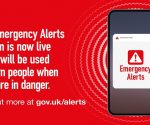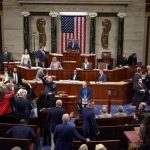The coronavirus police state (2): The illusion of police powers under Regulations 6 & 8 of Coronavirus Restrictions
Inevitably, as more people understand that the Covid-19 pandemic is a hoax, there is likewise going to be growing resentment and frustration caused by the perception that the population of the country is suffering infringement of its civil liberties by the enforcement of the UK Government’s lockdown regulations [or the Health Protection (Coronavirus, Restrictions) (England) Regulations 2020 (SI 350), or Coronavirus Restrictions Regulations, for short].
However, there is relief to be had, and empowerment so that citizens can conduct themselves in quietly lawful ways that will prove to be disempowering of the UK Government, while preventing it from exploiting its lockdown situation into something that would provide excuse for yet more draconian measures.
The opinion of Queen’s Councils recently published by the Society of Conservative Lawyers (SCL) (pdf) reinforces the appraisal made at FBEL, which was shared with readers soon after the UK Government’s lockdown regulations came into force, that police have no powers with respect regulating people being outside their home (while not assembling), and requiring them to return to their home. FBEL readers were told:
There appears to be no statute law that forbids anyone being outside. This would be why police have to resort to bullying in the first instance.
Indeed, further study (which there will be in these pages) promises to reveal that police power under the regulations is significantly curtailed by the same one stumbling block that affects the area that is the issue of discussion in this article. For the time being, and especially because it looks as if the UK Government will extend its lockdown, for the sake of assisting in the speedy installation of public confidence regarding rights regarding unlawful (and illegal) acts committed by police, there is a certain expedience to sharing findings as and when they have been discovered. Hence, this article is restricted to one area under the regulations.
To recap, the first paragraph of Regulation 6 of the lockdown regulations, under the heading, ‘Restrictions on movement’, states that “During the emergency period, no person may leave the place where they are living without reasonable excuse”. The regulation then lists the ways that people are permitted to be outside their homes. (Note, assembling outside the home is covered in Regulation 7, and will be covered at another time). Regulation 8 is titled “Enforcement of requirement”, and states (where it is most pertinent):
(3) Where a relevant person considers that a person is outside the place where they are living in contravention of regulation 6(1), the relevant person may—
(a) direct that person to return to the place where they are living, or
(b) remove that person to the place where they are living.
(4) A relevant person exercising the power in paragraph (3)(b) to remove a person to the place where they are living, may use reasonable force, if necessary, in the exercise of the power.
To summarise, a relevant person (which will be a police or special constable, in most people’s experience) may direct a person to return to his home, or return him by force, if it is deemed the person is out of doors with no good excuse.
Now, as reported in the FBEL report at the time, it was discovered that the authority of these regulations were derived from the Public Health (Control of Disease) Act 1984 (or purport to be), and section 45C(4)(d) in particular. However, they fall under a category of power defined in the Act called “special restriction or requirement” which is only orderable by a magistrate.
Looking at the legislation makes the issue quite clear:
(4)The restrictions or requirements mentioned in subsection (3)(c) include in particular—
(a)a requirement that a child is to be kept away from school,
(b)a prohibition or restriction relating to the holding of an event or gathering,
(c)a restriction or requirement relating to the handling, transport, burial or cremation of dead bodies or the handling, transport or disposal of human remains, and
(d)a special restriction or requirement.
(5)The power in subsection (1) is subject to section 45D.
(6)For the purposes of this Part—
(a)a “ special restriction or requirement ” means a restriction or requirement which can be imposed by a justice of the peace by virtue of section 45G(2), 45H(2) or 45I(2), but
(b)a restriction or requirement mentioned in subsection (4)(a), (b) or (c) is not to be regarded as a special restriction or requirement.’
The SCL paper covers the issue in this way:
Lord Anderson of Ipswich QC, the former reviewer of terrorism legislation, in a blog article published later on the very day of the making of the regulations has drawn attention to the doubts whether the making of the Coronavirus Restrictions Regulations was within the vires of 1984 Act5. His important article deserves to be widely read in full. In brief he points out that Coronavirus Restrictions Regulations purport to have been made under s.45C(4)(d) of the 1984 Act. The relevant power there is for the Secretary of State to impose a “special restriction or requirement”. That term of art is defined as one which could be imposed by a justice of the peace under another section. He points out that the “only remotely close match” for the 2020 stay-at-home regulation is a 1984 Act power for a JP to impose restriction “on where P goes or with whom P has contact”.
The SCL paper then walks through interpretation by a number of experienced legal professionals. That belonging to the said Lord Anderson is presented first, where he supposes that the legitimisation of police power is thought to come in scaling up the subject of a magistrates order from a “specified individual in respect of whom there has been a judicial finding of contamination” to the whole population. The SCL paper presents the brief details of one who thinks that “regulations have been lawfully made and are within the powers of the 1984 Act”, and another who thinks that the “regulations go well beyond the powers given by the 1984 Act. And then more space is given over to the following oppositional voice:
[In a paper]… Tom Hickman QC, Emma Dixon and Rachel Jones, of Blackstone Chambers… argue (para. 45) that ‘there is by no means a clear or satisfactory basis for such extraordinary powers’, and (para. 46) urge (matching the view we had already expressed) that ‘it would be greatly preferable, particularly if the measures are to persist for any length of time, that they be considered by Parliament and placed on a firmer legislative footing’.
It would perhaps be fair to say that the sentiment expressed in this extract represents the conclusion settled upon by the authors of the SCL paper (Lord Sandhurst QC, and Anthony Speaight QC). It is the opinion of the author of this article that if the only way that police powers could be legitimised is by collectivising guilt, which is basically what is being discussed, then it is farcical indeed. An individual cannot be treated as a suspect because of a tendency belonging to a greater population. There can be no justification in this idea, or else English law, based on the notion of innocence of the individual until he is proven guilty, is entirely overthrown – which it cannot be, at the peril of those trying.
There is another principle of common law that provides a further stumbling block to the exercise of supposed police powers under Regulation 6. Police have no power to stop and interrogate an individual except when empowered to do so by particular legislation, and generally in relation to suspicion of the execution of a crime or the detection of a felon.
Because the SCL paper deals with this issue perfectly, the relevant section is reproduced here in verbatim:
Under the general law there is a power for a constable to stop a car being driven on a road. There is also a power, having stopped a motorist, for a constable to require him to produce his driving licence, insurance and MOT (the latter two being of limited relevance in view of the information being held at the Swansea Centre today). Road checks of all vehicles can be carried out to search for a wanted person, but only on the authority of an officer at rank of superintendent or above. Beyond that there is no power to ask a motorist to give an account of the reason for the journey.
There is no non-statutory power at all for a police officer to stop a pedestrian and ask him or her to give an account. A Government website advises the public that if a police officer stops you and asks you questions, you do not have to stop and do not have to supply your name or answer any questions. A qualified power exists to stop and search but only if the officer has a reasonable suspicion of drugs, a knife or stolen goods, or under specific authorisation from a higher level.
It might be argued that the specific authorisation mentioned would fall under a theorised magistrates order against a population, but again, the insult would be too grievous to bear for the legal system to be allowed to survive.
Logically, it would follow that if a police constable cannot question an individual as to his law abiding purpose, then a police constable cannot enforce any power in Regulation 8. Be that as it may, the SCL paper points out how the constable does not have to require reasonable grounds to forcibly return a person home, and how this is in marked contrast to anything else he would do where he would require reasonable grounds. And although it is suggested that “a court would imply a requirement for reasonable grounds”, it is also recorded that
If such an obligation was wholly obvious, one wonders why Parliament has on so many other occasions expressly legislated a requirement for reasonable grounds.
In explanation, consider the few examples that the SCL paper gives where police powers are dependent on conditions, and consider the nature of the condition:
There is an express statutory provision that a police superintendent may authorise a road check only if he has reasonable grounds for suspecting that a person wanted in connection with an indictable offence would be in a vehicle which is stopped. There is an express statutory provision that a police officer may enter premises for the purpose of an arrest only if he has “reasonable grounds” to suspect the wanted person is there. A police officer may arrest without warrant only if he has “reasonable grounds” for believing that appropriate circumstances exist.
Think of it like this: if the police are not regulated by expressly stipulated conditions, they have carte blanche to be unreasonable. The power under Regulation 8, then, is an aberration, and that is why it is highly dubious from a legal standpoint. Lawfully, it is criminal, of course, and any individual would do well to remind any official attempting to enforce any part of the regulation of the potential predicament it would create for the official.
Having dealt with Regulations 6 and 8, it is worthwhile reminding the reader that police have been given powers to remove an individual (to a place for assessment) under the Coronavirus Bill. However, this power is conditional (as explained above, police power usually is), and the reader is asked to read the analysis presented in the FBEL article, The coronavirus police state: when suspected of infectiousness by police.
It is important to bear the Coronavirus Bill in mind when discussing the Coronavirus Restrictions Regulations because of how the police have now, after it was warned that they would here at FBEL, attempted to apply a right to question and give instructions granted under the Bill to the execution of the Regulations. The Coronavirus Bill enables police power on the condition that there was “reasonable grounds to suspect that a person… is potentially infectious”. The instructions that a police give in relation to this, which do incur fines as penalty if they are not followed, are not the same instructions of the Regulations. The warning at FBEL was this:
It is quite possible… that a constable… [may be] under the impression that they are fining people for failing to comply with an instruction, as per the process in the Coronavirus Bill. However, the instruction that should have been issued in that context would have been as defined in paragraph 20 of Part 2 of Schedule 20 of the Coronavirus Bill.
So, the case where police did try something like this (if not the very same thing), only for it to be thrown out (only after a magistrates court had issued a fine), involved a woman, Marie Dinou, 41, from York, as she happened to be in Newcastle Central rail station:
Ms Dinou had been suspected of a railway ticket offence, but the Coronavirus Act 2020 – which only applies to “potentially infectious persons” was used to prosecute her instead…
Schedule 21 creates an offence of “failing to without reasonable excuse to comply with any direction, reasonable instruction, requirement or restriction” imposed as part of the act.
But the law can only apply to “potentially infectious persons” and is separate to the newer Health Protection Regulations that allow police to enforce the UK lockdown.
Please note, Schedule 21 of the Coronavirus Bill, which the author has not yet appraised, appears to deal with premises (presumably, people in them), but it is strongly suspected that the writer of the Independent article from whence the above extract was taken means Schedule 20. In any case, the upshot is the same thing. The Times called the reason for Dinou’s fine, a “crime that ‘doesn’t exist’”. Note it well, dear reader.
Previously: The coronavirus police state: regarding extended “lockdown” powers; part the first (link).
Next: The coronavirus police state (3): Gathering, and gatekeeping (link).


















